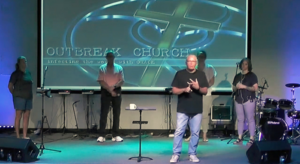By Aaron Earls
Baptist Press
 ROCK HILL, S.C. — The pandemic forced churches across the country to make significant changes, but none were quite like the one at Stony Fork Community Church, formerly known as Outbreak Church.
ROCK HILL, S.C. — The pandemic forced churches across the country to make significant changes, but none were quite like the one at Stony Fork Community Church, formerly known as Outbreak Church.
After enduring the impact of COVID-19 like most every other congregation, pastor Scott Carroll, along with the elders and staff of Outbreak Church, began to think about how they would emerge on the other side of the pandemic and what their church would look like.
Like most other Protestant churches in the U.S., Outbreak cancelled in-person services by April 2020 and moved online. When they returned later that year, similar to other congregations, they implemented social distancing and other safety measures. But they were also working on something even more dramatic—a name change for the seven-year-old church.
In the summer of 2013, Scott Carroll was discussing with another pastor what to name the church Carroll would be planting later that year. The other pastor asked Carroll what he wanted the church’s identifying characteristic to be.
“I said, ‘I want to be around people who are so infected with Jesus that every time they turn around, they sneeze Jesus,’” Carroll said. When the other pastor said that was like an “outbreak,” they both looked at each other and said, “Outbreak Church.” So, in November 2013, Outbreak Church was launched in a rural area south of Rock Hill, S.C.
“We based our entire DNA around pandemic and epidemic verbiage,” Carroll said. “We talked about: You’re the point source of the Gospel; Infect others with the Gospel of grace.”
The church made shirts and bracelets with the phrase: Are you contagious?
“People would come up, read the shirt, and ask, ‘Are you contagious with what?’ and we would get to say, ‘Jesus. Have you been infected with Jesus, yet?’” Carroll said. “God was blessing and using that.”
Their slogans and logo, which was a cross emerging from a hazmat symbol, suddenly changed connotations in March 2020.
 “That was hip and cool until COVID hit,” Carroll said. “People didn’t want to talk about pandemics and infections because people were dying from them everywhere. Our name wasn’t an issue with the congregation, but we realized it was an issue with the community.”
“That was hip and cool until COVID hit,” Carroll said. “People didn’t want to talk about pandemics and infections because people were dying from them everywhere. Our name wasn’t an issue with the congregation, but we realized it was an issue with the community.”
Carroll said visitors would come to the church and say they liked everything about it – except the name.
“The director of our preschool area told me we had families that wanted to sign up to participate in our mom’s-day-out program, but the name was a hold-up to them putting their kids in our church,” he said. “If the name is a stumbling block, we need to pursue this. A name is just a name.”
Hearing some feedback and contemplating how they could best serve their community after the pandemic, Carroll and the church’s elders began to seriously think about giving Outbreak Church a new name.
During this time, Carroll said the state of South Carolina began to rebuild a bridge across Stony Fork Creek, which ran at the southern border of the church’s property.
“I would see the name ‘Stony Fork’ run through my office all the time,” he said. Also, in doing some research about the area, they discovered it had previously been called the Stony Fork Community in the 1940s and ‘50s. Carroll said leaders began to ask, “What if we resurrected that name and became a beacon of light and hope to the Stony Fork community?”
With that, the church began a multiyear process of changing their name from Outbreak Church to Stony Fork Community Church. While they are still waiting on the IRS to make things completely official, the church has already implemented the name change. Members were told about the shift at a church picnic and baptism service in July. Carroll said there was an excitement among church members after hearing about the name change.
They’ve also seen a positive response in the one area they were most concerned about: their community.
“Every week since we put the signs up with the new name, we’ve had more than one first-time family show up to church,” Carroll said. “We’re the same people with the same passion and the same purpose, but a different name.”
The pastor said the move was not a reaction to “the government, the media, conspiracy theories, or anything like that. This was following the Holy Spirit’s leadership in taking the next step for our community. I don’t want to keep anybody out of heaven because they didn’t like the name of our church.” B&R
